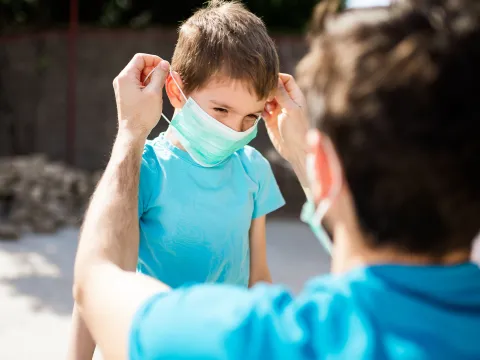- AdventHealth

As we continue to manage our new normal, reports of another wave — or continued waves — of coronavirus cases are understandably upsetting. Moving forward, our new normal is likely to alternate between periods of relative freedom and tightening restrictions in places where COVID-19 levels rise again, according to the Infectious Diseases Society of America.
In either scenario and throughout our new normal, there are safe ways to get back to life — from grocery shopping to getting health care. Stay vigilant and continue to practice the safety precautions you already know, like wearing your mask and practicing social distancing. When we all do our parts to remain responsible, we can make a difference in our new normal.
How We Got Here
The Centers for Disease Control and Prevention (CDC) guidelines from the spring were designed to keep us safe as businesses, schools, churches and other organizations gradually opened after the COVID-19 shutdown. Safety measures such as social distancing, wearing cloth face coverings and extra cleaning helped permit a gradual return to work, church and social activities.
Despite these efforts, some communities are experiencing rises in COVID-19 cases. With this in mind, it’s important for everyone to balance being safe with moving forward in the new normal. Slowing the spread of the virus is everyone’s responsibility, and it helps us avoid another lockdown and recurrence of stay-at-home orders.
The Race for a Treatment
Although scientists around the globe are studying the virus, there is no vaccine or proven medications to prevent or cure coronavirus, yet. Several therapies are, however, currently being tested in clinical trials to evaluate whether they are safe and effective. Until a vaccine becomes widely available, or a medication proves effective in treatment, we’ll likely have to keep making adjustments in our daily lives.
It’s important to understand that in the absence of a vaccine or effective drug treatments, you can do your part to slow the spread of COVID-19. It all starts with you and your family being responsible, safe and smart instead of growing complacent.
What to Do to Avoid Another Lockdown and Take Care of Yourself, Too
We know that it’s tiring to hear about COVID-19, rising cases and safety measures. But now’s not the time to ease your safety precautions. Make them a part of your new normal way of life to keep yourself and the people around you safe. Here’s what you can do to make a positive difference.
Take It a Day at a Time
While there may be difficult times ahead, it’s important to stay focused on the present. Remember that it’s natural to feel uneasy when there’s a gap between what we know and what we want to understand.
Follow Expert Guidelines
Be sure to stay informed about the latest recommendations from your state, county and city. Also, check the CDC website and our Coronavirus Resource Hub for the latest coronavirus updates, guidelines and tips.
Be Prepared
The CDC recommends creating a household plan to help protect your health and the health of those you care about. This includes an isolation strategy if a family member has or is suspected of having COVID-19.
Practice Good Hygiene
You can reduce the risk of contracting COVID-19 and slow the spread of the virus. The CDC recommends that you:
-
Wear a face mask to cover your mouth and nose when around others
-
Avoid touching your eyes, nose and mouth
-
Clean and disinfect frequently touched surfaces daily
-
Cover coughs and sneezes with a tissue and wash your hands immediately
-
Practice social distancing by staying 6 feet away from others in public
-
Stay home if you’re sick
-
Wash your hands often with soap and water or sanitizer that is at least 60% alcohol
Take Care of Your Emotional Well-Being
Shifts between greater mobility and staying at home may be stressful. If you’re having signs of distress such as sleeplessness, trouble concentrating or feelings of hopelessness, the CDC recommends that you:
-
Eat healthy foods
-
Do relaxation exercises
-
Follow a regular sleep schedule
-
Get some exercise on most days of the week
-
Participate in activities you enjoy, like morning walks
-
Stay in contact by phone and texts with family and friends
-
Take breaks from thinking or talking about the virus
-
Talk with your health care team right away about any mental health concerns
-
Try to follow a regular schedule
In an emotional crisis, you can get immediate help by calling the Disaster Distress Helpline at Call1-800-985-5990 or text TalkWithUs to 66746. Or, call the National Suicide Hotline at Call1-800-273-8255 or text HOME to 741741 to reach the Crisis Text Line.
Stay in Contact With Your Health Care Team
Our teams are here to keep you protected during in-person visits for all your health care needs. You can talk with your AdventHealth caregivers virtually through your smartphone, tablet or computer. During a telehealth visit, you and your physician can decide together how to get care when and where you need it. Download the free AdventHealth app to get started.
Also, be sure to call your physician right away if you feel sick or think you have COVID-19 symptoms (cough, shortness of breath, fever, chills, muscle pain, sore throat or new loss of taste or smell).
As we navigate the new normal together, we encourage you to balance staying safe with moving forward. Stay vigilant and stay responsible in public to keep yourself and everyone around you safe. We can all do our parts to make the new normal a little better.
We’re Ready to Meet Your Needs and Keep You Protected
As you stay vigilant in the community, know that AdventHealth is a safe haven for you: Extra precautions have become part of our new normal for your protection. We’re here to help you get back on track with health care like normal and to support you in body, mind and spirit. Whether you need safe, whole-person care or the latest news and information, we’re with you every step of the way to help navigate the healthiest path forward.


